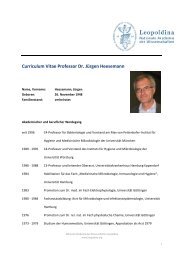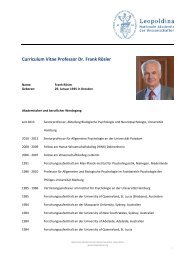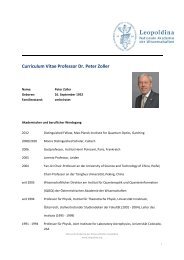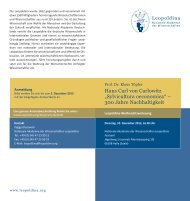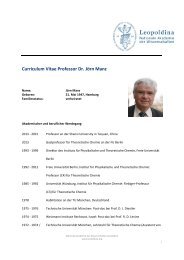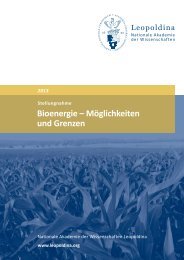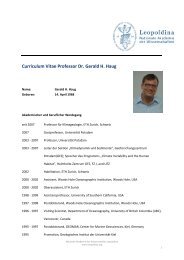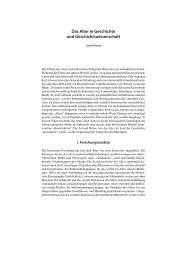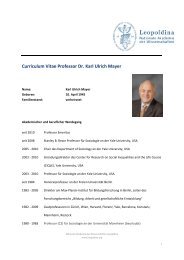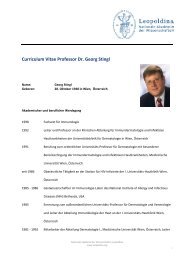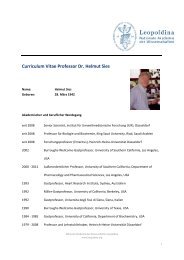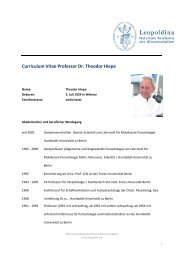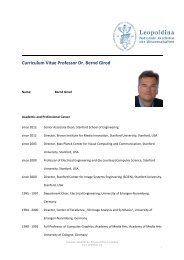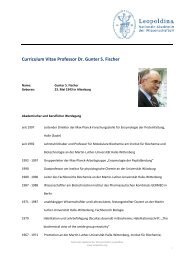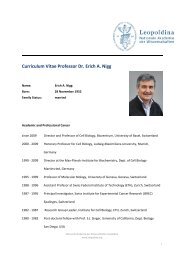CV Peter B. Becker - Leopoldina
CV Peter B. Becker - Leopoldina
CV Peter B. Becker - Leopoldina
You also want an ePaper? Increase the reach of your titles
YUMPU automatically turns print PDFs into web optimized ePapers that Google loves.
Curriculum Vitae Professor Dr. <strong>Peter</strong> <strong>Becker</strong><br />
Name: <strong>Peter</strong> B. <strong>Becker</strong><br />
Born: 12 September 1958<br />
Family Status: married<br />
Academic and Professional Career<br />
since 2008 Acting Director of the Adolf-Butenandt-Institute, Germany<br />
since 1999 Full Professor (C4/W3) and Head of Molecular Biology Section, Adolf-Butenandt<br />
Institute, Faculty of Medicine, Ludwig-Maximilians-Universität, München, Germany<br />
1996 - 1999 Group leader, European Molecular Biology Laboratory (EMBL), Heidelberg, Germany<br />
1996 Habilitation at Ruprecht-Karls Universität, Heidelberg, Germany<br />
1988 - 1996 Postdoctoral fellow with Dr. Carl Wu, Laboratory of Biochemistry,<br />
National Cancer Institute, NIH, Bethesda, USA<br />
1987 - 1988 Postdoctoral fellow with Prof. G. Schütz, DKFZ, Heidelberg, Germany<br />
1987 Ph.D. at Ruprecht-Karls-Universität, Heidelberg, German Cancer Research Center,<br />
Heidelberg<br />
1978 - 1983 Study of Biology, Ruprecht-Karls-Universität,Heidelberg, Germany<br />
Nationale Akademie der Wissenschaften <strong>Leopoldina</strong><br />
www.leopoldina.org<br />
1
Project coordination, Membership in collaborative research projects (Selection)<br />
2011 - 2014 Network of Excellence “EpigeneSys“; associated member¸selected representative of<br />
the associated members<br />
since 2007 Founding Member and Member of the Board of the Excellence Cluster “Munich<br />
Center for Integrated Protein Science“<br />
2004 - 2010 Network of Excellence “The Epigenome” (founding member)<br />
since 2002 Spokesperson of the Transregio 5 DFG Research Network<br />
1998 - 2001 Coordinator of the EU TMR Network ERBFMRXCT98-191, Gene regulation by<br />
Chromatin<br />
Functions in Scientific Societies and Committees (Selection)<br />
2008, 2012 Study section ‘Cell Biology’ of the German Research Council (DFG)<br />
2005 - 2009 Scientific Advisory Board, Fritz Lippmann Institut für Alternsforschung, Jena<br />
2005 - 2007 Selection Committee for the Award of the Heinz-Maier Leibnitz-Prize of the DFG<br />
2004 - 2005 EMBO Long Term Fellowship Committee<br />
since 2003 Authorized representative of the Medical Faculty for building a Biomedical Centre<br />
since 2003 Editorial Board, Public Library of Sciences (PLOS) Biology<br />
since 2002 Editorial Board, EMBO Reports<br />
2002 - 2011 Editorial Board, EMBO Journal<br />
2000 - 2005 Editorial Board, Molecular and Cellular Biology (MCB)<br />
2000 - 2004 Steering Committee of the European Forum of Bioethics<br />
since 1999 Editorial Board, Nucleic Acids Research (NAR)<br />
1997 - 2003 Editor of Chromosoma (Springer Verlag, Heidelberg)<br />
1997 - 2203 Executive Editor of Nucleic Acids Research (Oxford Univ. Press)<br />
Nationale Akademie der Wissenschaften <strong>Leopoldina</strong><br />
www.leopoldina.org<br />
2
Honours and Awarded Memberships (Selection)<br />
2011 ERC Advanced Investigator Grant awarded<br />
2007 Member of the German Academy of Science <strong>Leopoldina</strong><br />
2007 Member of Academia Europaea<br />
2005 Gottfried-Wilhelm Leibniz Prize of the German Research Foundation (DFG)<br />
2000 Member of EMBO (European Molecular Biology Organisation)<br />
1990 Postdoctoral fellowship, Fogarty Society at NIH<br />
1988 Postdoctoral fellowship, German Research Foundation (DFG)<br />
1988 Richtzenhain-Prize for Cancer Research, DKFZ, Heidelberg, Germany<br />
1987 Young Investigators Award, "Society for Molecular Biology", Heidelberg, Germany<br />
Major Scientific Interests<br />
Our group is interested in understanding the principles and mechanisms that regulate<br />
genome functions through dynamic alterations of chromatin organisation. One focus of our<br />
research is on the physiological role of the nucleosome remodeling factos. These molecular<br />
machineries alter DNA-histone contacts in nucleosomes at the expense of chemical energy. A<br />
second focus lies on the phenomenon of ‚dosage compensation’ in fruit flies, as an example<br />
for the over-arching rolel of chromatin organisation in balancing genome expression.<br />
Nationale Akademie der Wissenschaften <strong>Leopoldina</strong><br />
www.leopoldina.org<br />
3



